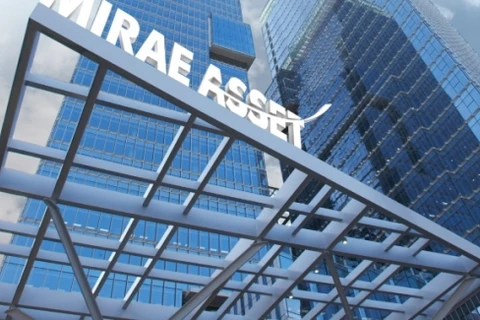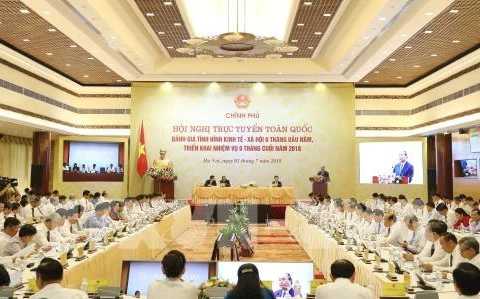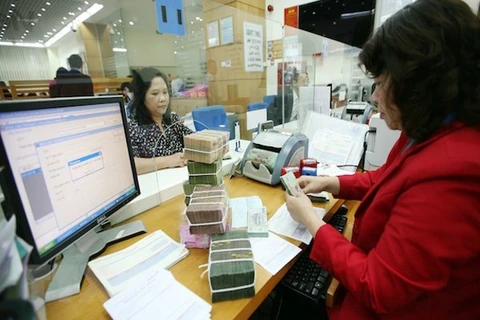Hanoi (VNA) - Vietnam is confronting challenges in the process of restructuring the public financial sector, Deputy Minister of Finance Do Hoang Anh Tuan said during a forum in Hanoi.
Deputy Minister Tuan gave his assessment of the process at Vietnam Finance Forum 2018 held in Hanoi on September 20.
As much as 82 percent of State revenue currently comes from domestic collection, but this is not yet sustainable because a substantial portion of local revenue comes from the sale of public assets and land use rights, Tuan said.
Transfer pricing, tax evasion and trade fraud are still problems for the country’s financial sector, he said.
State budget management remains cumbersome, he said, adding that the Government must improve its methods for managing national public assets.
The Government’s outstanding debt stands at 61.3 percent of the country’s GDP and foreign debt is 50 percent. Although public debt has been controlled, challenges remain. The Deputy Minister cited exchange rate risks and Government guarantees for private sector loans as major issues.
The business community is reliant on credit, he said.
Tuan added outstanding bank loans amount to 1.4 percent of GDP, much higher than the recognised acceptable level of 0.6-0.8 percent. This is obviously a challenge for the financial sector.
He stressed the need to find an abundant and sustainable source of capital for the corporate sector, adding that the restructuring efforts can not be delayed. The Ministry of Finance has tried to consolidate the country’s budget and expenditures.
According to USAID Mission Director for Vietnam Michael Greene, impressive growth has transformed the country’s economy into that of a middle-income country.
USAID will continue to actively support Vietnam in financial institution reform for rapid and sustainable economic growth, with the overall goal of promoting national self-reliance, Greene said.
Bruno Angelet, head of the European Union delegation to Vietnam, said the EU considers the country’s public finance reform an important issue.
He said the EU hopes to help Vietnam address climate change, pollution, taxation and financial management as it transitions to a green economy.
Themed restructuring national finance towards rapid, inclusive and sustainable development, the forum drew about 300 delegates from the Party Central Committee’s Economic Commission, the Ministry of Finance, the State Bank of Vietnam and the Ministry of Planning and Investment.
The United States Agency for International Development (USAID), the European Union and the World Bank also sent delegates to the event.-VNA
Deputy Minister Tuan gave his assessment of the process at Vietnam Finance Forum 2018 held in Hanoi on September 20.
As much as 82 percent of State revenue currently comes from domestic collection, but this is not yet sustainable because a substantial portion of local revenue comes from the sale of public assets and land use rights, Tuan said.
Transfer pricing, tax evasion and trade fraud are still problems for the country’s financial sector, he said.
State budget management remains cumbersome, he said, adding that the Government must improve its methods for managing national public assets.
The Government’s outstanding debt stands at 61.3 percent of the country’s GDP and foreign debt is 50 percent. Although public debt has been controlled, challenges remain. The Deputy Minister cited exchange rate risks and Government guarantees for private sector loans as major issues.
The business community is reliant on credit, he said.
Tuan added outstanding bank loans amount to 1.4 percent of GDP, much higher than the recognised acceptable level of 0.6-0.8 percent. This is obviously a challenge for the financial sector.
He stressed the need to find an abundant and sustainable source of capital for the corporate sector, adding that the restructuring efforts can not be delayed. The Ministry of Finance has tried to consolidate the country’s budget and expenditures.
According to USAID Mission Director for Vietnam Michael Greene, impressive growth has transformed the country’s economy into that of a middle-income country.
USAID will continue to actively support Vietnam in financial institution reform for rapid and sustainable economic growth, with the overall goal of promoting national self-reliance, Greene said.
Bruno Angelet, head of the European Union delegation to Vietnam, said the EU considers the country’s public finance reform an important issue.
He said the EU hopes to help Vietnam address climate change, pollution, taxation and financial management as it transitions to a green economy.
Themed restructuring national finance towards rapid, inclusive and sustainable development, the forum drew about 300 delegates from the Party Central Committee’s Economic Commission, the Ministry of Finance, the State Bank of Vietnam and the Ministry of Planning and Investment.
The United States Agency for International Development (USAID), the European Union and the World Bank also sent delegates to the event.-VNA
VNA























